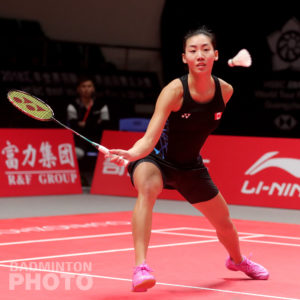Text by BWF
Badminton players, like their peers in other sports, aren’t used to leading physically restricted lives. For elite players in particular, who are used to spending most of their time training, competing or travelling, developments over the last month have posed challenges they’ve never faced before. From leading physically active lives, they’ve had to adapt to life under lockdown.
 Yet, elite players have achieved their success primarily because they seek to make the best of every situation on court. Following this principle, they are, for the most part, seeking to keep themselves sharp despite the challenges of social distancing and confinement. Some have also used the extra time available to pursue off-court interests.
Yet, elite players have achieved their success primarily because they seek to make the best of every situation on court. Following this principle, they are, for the most part, seeking to keep themselves sharp despite the challenges of social distancing and confinement. Some have also used the extra time available to pursue off-court interests.
The approach to training has varied depending on whether they are part of a national set-up or relatively independent, and also on the extent of the lockdown in their respective countries.
Independent players like Beiwen Zhang and Michelle Li have devised their own home workout routines.
“I haven’t been in contact with my coach, but I have been doing home workouts as well as running outdoors to keep my body in shape,” said world No.15 Zhang, who admits that it is “very difficult” to stay motivated.
Macau Open champion Michelle Li has turned crisis into an opportunity by setting up a home gym.
“I have turned my room into a gym,” said the world No.10 Canadian. “I’m using adjustable dumbbells since I can’t fit anything bigger into my room. It’s still great and I love it because there is such a wide variety of full-body exercises that I can carry out with dumbbells. I’ve also adopted a new habit to go out for runs and walks with my niece and enjoying nature more because it’s so easy to just trap yourself at home. I still connect with my coach once in a while just to check up and make sure I stay focused.”
Li’s compatriots are also training independently. Mixed doubles player Josephine Wu is using the extra time she has to learn Japanese through online lessons.
On the other hand, players from badminton powerhouses like Thailand and Malaysia have to follow a programme devised by team coaches, with daily workouts monitored live over video.
“I train with my teammates and coaches using the Zoom app,” said men’s doubles world No.9 Soh Wooi Yik. “I also have some weights in my house to keep myself fit. I have workouts at home with the programme given by my coaches and I watch videos of badminton matches to analyse my game.”
The situation is different for men’s singles No.2 Chou Tien Chen, who was quarantined along with the rest of the Chinese Taipei team on their return home from the All England.
“I was quarantined for 14 days. The government arranged a place for us to train while we were under quarantine. We spent half a day training and the other half in our own rooms. I read the Bible regularly, so I felt calm and spiritual peace,” said Chou.
The players have since returned to their homes; Chou’s compatriot Tai Tzu Ying even posted pictures of herself hiking in the woods.
Like Tai, players have used the time to pursue other interests. Taerattanachai frequently posts videos of herself playing the guitar or cooking; Soh Wooi Yik sings with his family and is learning cooking from his mother, while Danish star Mia Blichfeldt is into knitting and reading books. Her compatriot Anders Antonsen has uploaded several vlogs on his Youtube channel which offer a window into his life as an elite player.
Quite significantly, a few players are also doing their bit to help frontline workers working against the pandemic – Taerattanachai, for instance, posted pictures of herself making face masks at home that she later donated to hospitals.
Despite the uncertainty on the tenure of the lockdown, all players are glad that they are finally getting time to catch up with their loved ones. It is certain, therefore, that the players will be recharged and raring to go once the competition season kicks in again.







